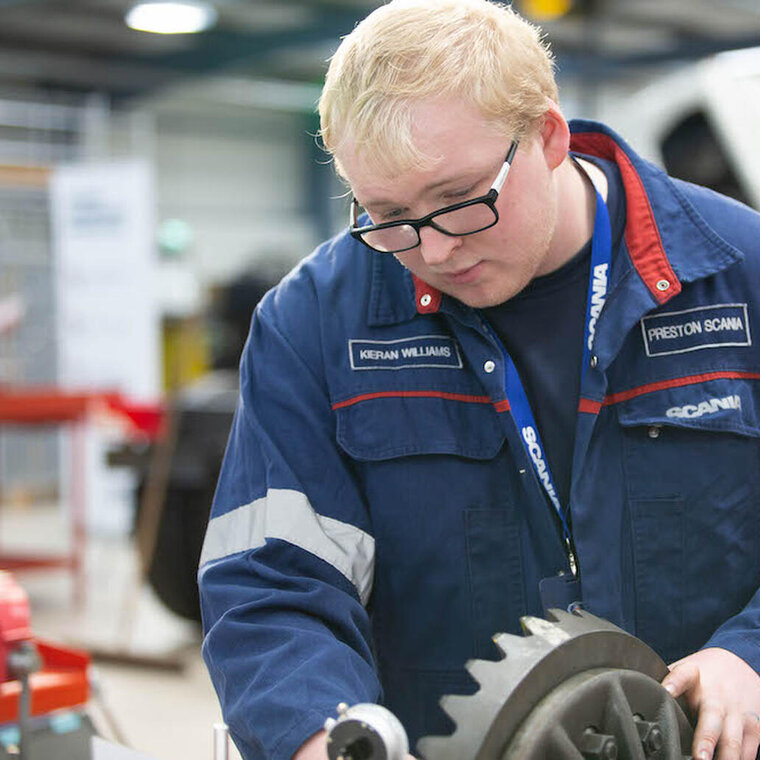Build future-ready teams with funded apprenticeships and expert training support
National Apprenticeship Week 2026
Build future-ready teams with funded apprenticeships and expert training support
Published: 25/06/2025

If you've ever wondered how to become a HGV mechanic or how to become an automotive technician, you're not alone. Every product in every home, supermarket, or warehouse has, at some point, relied on heavy vehicles to get there. Behind the scenes are the people who keep those vehicles moving-heavy vehicle technicians.
This blog is your clear, step-by-step guide to becoming one. Whether you're leaving school, switching careers, or looking for a hands-on route into the automotive sector, this is where you start.
Heavy vehicle technicians (sometimes called HGV mechanics) inspect, maintain and repair large commercial vehicles-lorries, trucks, buses, coaches, and more. These are complex machines, often operating under pressure and over long distances, which means high standards, quick thinking and sharp problem-solving skills are essential.
You’ll work on everything from engine diagnostics to suspension systems, electrical faults to safety inspections. And as the UK fleet transitions towards electric and hybrid, you’ll need up-to-date knowledge and specialist training to work safely with high-voltage components and digital systems.
This isn’t just a job-it’s a trade with real demand, progression and pride.
If you’re starting out, the most direct and respected route is through a Level 3 Heavy Vehicle Maintenance and Repair Apprenticeship.
This programme gives you:
The apprenticeship is designed for school leavers aged 16 and above, but it’s also open to adult learners looking to retrain. You don’t need previous experience-just the right attitude, a willingness to learn, and a basic foundation in maths and English.
The apprenticeship combines practical skills and technical knowledge. You’ll cover:
You’ll also gain knowledge in emerging technologies like electric vehicle maintenance and advanced diagnostics.
Your day might start with a scheduled service-checking brakes, lights, filters and fluid levels. By the afternoon, you might be diagnosing a fuel injection issue or replacing a failed electrical component. You’ll use specialist diagnostic tools, work under pressure, and always have to keep safety front and centre.
You’ll typically:
Your pay depends on your age, experience and employer-but the earning potential is strong:
Apprentices: £7.55 per hour (Roughly £15,000+ per year)
Qualified Technicians: £22,000 to £26,000 per year
Senior/Master Technicians: Up to £40,000 or more with experience and further training
Many employers also offer bonuses, overtime pay, and structured progression opportunities.
Heavy vehicle technicians are needed everywhere. Common employers include:
With skills and experience, you could specialise in electric vehicles, diagnostics, fleet inspection, or even move into training or management roles.
The UK’s road transport network is evolving. By 2030, the sale of new petrol and diesel cars will end, and the focus on clean, efficient fleets will increase. This shift means a major rise in demand for EV-qualified technicians.
We’re already training apprentices in EV and hybrid systems, so they’re ready for what’s next-not just what’s now.
Remit is one of the UK’s leading training providers in the automotive sector. We work with some of the world’s biggest vehicle brands to train the next generation of heavy vehicle technicians.
You’ll benefit from:
Heavy vehicle technicians are vital to the economy, vital to safety, and vital to progress. If you’ve got the mindset, the interest and the drive to get hands-on, this is a career that delivers.
Whether you call it a HGV mechanic, heavy vehicle technician or automotive technician-it starts with training, and it starts with you.
If you’re serious about becoming a heavy vehicle technician, there’s no better time to start.